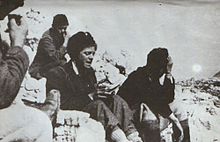Ivan Goran Kovačić
Ivan Goran Kovačić (born March 21, 1913 in Lukovdol near Vrbovsko , † July 13, 1943 in Vrbnica near Foča ) was a Yugoslav writer.
Life
The Croatian on his mother's side of Jewish origin Ivan Kovačić came from the Gorski kotar , a wooded mountainous region of Croatia. Since this region has shaped him very much, he nicknamed himself Goran. He lost his father at an early age so that he had to live in poverty with his mother and younger brother. After attending elementary school in his birthplace, he went to grammar school in Karlovac from 1923 to 1926 , then in Zagreb , where he graduated in 1932. In Zagreb he studied Slavic Studies until 1936, but did not graduate.
He started as a proofreader at Hrvatski dnevnik , and later became an editor there. After he got lung disease in 1938, he tried to become a cultural attaché in Bucharest in 1940, but it failed. Instead, he became an editor at the Novosti newspaper , which was discontinued in 1941. In the Independent State of Croatia he was initially appointed head of the post office in Foča, but he managed to get a job in a book publisher. In 1942 Kovačić went to the communist Tito partisans together with Vladimir Nazor . Kovačić was captured and brutally murdered by nationalist Serb Chetniks during the Battle of the Sutjeska in Vrbnica near Foča . His grave is unknown.
Works
Kovačić wrote poems, stories and essays. He describes the hard and merciless fate of the people of his homeland, the Gorski kotar. Best known was his poem Jama , a passionate indictment of the horrors of the war that arose among the partisans in his time and which has been translated into many languages. Even Pablo Picasso was inspired by the work.
- Lirika , Zagreb 1932
- Dani Gnjeva , Novellas, Zagreb 1936
- The great avenger, story, German 1942
- Hrvatske pjesme partizanke , Šuma Javornica 1943
- Jama , Poem, Bari 1944 (German: The mass grave, Zagreb 1962)
- Ognji i rože , Zagreb 1945
- Djela , 7 vols., Zagreb 1946–49
- Izabrana djela , Zagreb 1975
- Sabrana djela , 5 vols., Zagreb 1984
Afterlife
In 1993 the Croatian Post issued a stamp in honor of the poet. A school in Slavonski Brod is named after him, as is the Academic Choir in Zagreb. There is a memorial plaque on the house where he was born in Lukovdol and a memorial next to it. The Goranovo prolječe event is held here every year on the writer's birthday .
literature
- Šeper: Kovačić Ivan. In: Austrian Biographical Lexicon 1815–1950 (ÖBL). Volume 4, Verlag der Österreichischen Akademie der Wissenschaften, Vienna 1969, p. 168.
Web links
- Literature by and about Ivan Goran Kovačić in the catalog of the German National Library
Individual evidence
- ↑ Zdravko Dizdar: Četnički zlocini u i Bosni Hercegovini: 1941.-1945 . Ed .: Hrvatski institut za povijest. Dom i svijet, Zagreb 2002, ISBN 953-6491-86-9 , p. 369 .
| personal data | |
|---|---|
| SURNAME | Kovačić, Ivan Goran |
| BRIEF DESCRIPTION | Yugoslav writer |
| DATE OF BIRTH | March 21, 1913 |
| PLACE OF BIRTH | Lukovdol |
| DATE OF DEATH | July 13, 1943 |
| Place of death | Vrbnica near Foča |

